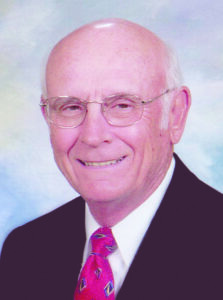Uncategorized
Dunagin: Once a Sustainer, Now a Hazard
Recent news that the City of Hattiesburg will receive $3 million in a settlement related to claims against the owners of the former Hercules plant grabbed my attention for a number of reasons, not the least of which is the fact that I was born almost within the shadow of the plant.
My father, the late R.R. “Huck” Dunagin worked there from before I was born until he retired sometime in the 1970s. As he told it, he was hired during the 1930s depression primarily because he was a good baseball player and Hercules, in those days, had a baseball team.
By the time I reached college, Dad had some influence over hiring, and I worked two summers for Hercules — one in the South Alabama woods harvesting virgin pine stumps and one in the plant in what was called the “Bull Gang.” The “Bull Gang” consisted of a group of men who performed common labor jobs: digging ditches, unloading rail cars, rolling wheel barrow loads of concrete to construction or repair sites and, occasionally, working on an assembly line capping turpentine containers.
Most of the guys I worked with in the plant were waiting for a better, higher-paying skilled job. I was waiting for September to get back to school and cool weather.
When I was growing up, Hercules was considered among the best places, if not the best place, in Hattiesburg to work.
The wages, working conditions and fringe benefits were way above average for that place and time.
Working there in the 1950s was like being part of a community. At one time Hercules had a commissary where employees could buy groceries, a restaurant, a recreation room and a barber shop. As a young boy, I recall getting haircuts there.
Wilmington, Del.-based Hercules Powder Co., a manufacturer of explosive gunpowder, opened the Hattiesburg plant in the 1920s to extract rosin from pine stumps which were plentiful in South Mississippi following widespread harvesting of virgin pine forests.
Over the years Hercules expanded to produce a wide range of wood based chemical raw materials used in products as unrelated as pesticides and chewing gum. The name of the company eventually was changed to Hercules, Inc.
Covington, Ky. based Ashland, Inc., purchased Hercules, Inc, in 2008 and the following year ceased operations at the Hattiesburg plant which now sits idle.
For those who didn’t work at Hercules during its heyday or were not employed by merchants who depended on the plant’s payroll, there was a downside: namely the smell, which was awful at times, and now the lingering environmental effects.
The pine stumps didn’t put off a bad odor until the chemicals kicked in but then the smell could get rank. While there were complaints about the more than occasional bad odor, those who depended on Hercules said it smelled like money.
The $3 million settlement going to Hattiesburg is the result of a lawsuit claiming contamination from the factory may have leached into the city’s water supply. Hercules is under orders from the U.S. Environmental Protection Agency to clean up sludge at the plant’s impoundment basin and to monitor potential environmental risks in and around the site.
The environmental problems at Hercules are not unique. There are many other now vacant former factory sites in Mississippi, many of them related to the wood industry and some to the railroads, that are considered environmental hazards.
Back in the day they helped sustain a lot of families, including mine.
So I certainly can’t complain about whatever the operators of Hercules did back when there weren’t nearly as many environmental regulations as there are today and when people didn’t know as much about potential hazards as they do now.
But Hercules and a number of other now closed factory locations are a testament to the need for environmental regulations that often come under criticism by economic developers.
Maybe the bureaucrats do get unreasonable at times, and there’s nothing wrong with criticizing them when they do. But they aren’t all wrong all the time.
Charles Dunagin is a retired editor and publisher who is currently residing in Oxford, Mississippi. He can be reached at cdunagin@enterprise-journal.com.
Follow HottyToddy.com on Instagram, Twitter and Snapchat @hottytoddynews. Like its Facebook page: If You Love Oxford and Ole Miss…











































